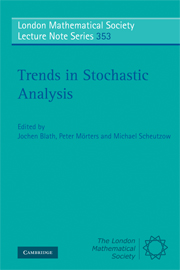Book contents
- Frontmatter
- Contents
- Preface
- Heinrich von Weizsäcker's students
- Heinrich von Weizsäcker's publications
- I Foundations and techniques in stochastic analysis
- II Construction, simulation, discretization of stochastic processes
- 5 Construction of surface measures for Brownian motion
- 6 Sampling conditioned diffusions
- 7 Asymptotic formulae for coding problems: a review
- III Stochastic analysis in mathematical physics
- IV Stochastic analysis in mathematical biology
6 - Sampling conditioned diffusions
Published online by Cambridge University Press: 05 March 2012
- Frontmatter
- Contents
- Preface
- Heinrich von Weizsäcker's students
- Heinrich von Weizsäcker's publications
- I Foundations and techniques in stochastic analysis
- II Construction, simulation, discretization of stochastic processes
- 5 Construction of surface measures for Brownian motion
- 6 Sampling conditioned diffusions
- 7 Asymptotic formulae for coding problems: a review
- III Stochastic analysis in mathematical physics
- IV Stochastic analysis in mathematical biology
Summary
Abstract
For many practical problems it is useful to be able to sample conditioned diffusions on a computer (e.g. in filtering/smoothing to sample from the conditioned distribution of the unknown signal given the known observations). We present a recently developed, SPDE-based method to tackle this problem. The method is an infinite-dimensional generalization of the Langevin sampling technique.
Introduction
In many situations, understanding the behaviour of a stochastic system is greatly aided by understanding its behaviour conditioned on certain events. This allows us, for example, to study rare events by conditioning on the event happening or to analyse the behaviour of a composite system when only some of its components can be observed. Since properties of conditional distributions are often difficult to obtain analytically, it is desirable to be able to study these distributions numerically. This allows us to develop meaningful conjectures about the distribution in question or, in a more applied context, to derive quantitative information about it. In this text we present a general technique to generate samples from conditional distributions on infinite-dimensional spaces. We give several examples to illustrate how this technique can be applied.
Sampling, i.e. finding a mechanism which produces random values distributed according to a prescribed target distribution, is generally a difficult problem. There exist many ‘tricks’ to sample from specific distributions, ranging from very specialized methods, like the Box–Müller method for generating one-dimensional standard Gaussian distributed values, to generic methods, like rejection sampling, which can be applied to whole classes of distributions.
- Type
- Chapter
- Information
- Trends in Stochastic Analysis , pp. 159 - 186Publisher: Cambridge University PressPrint publication year: 2009
- 14
- Cited by

